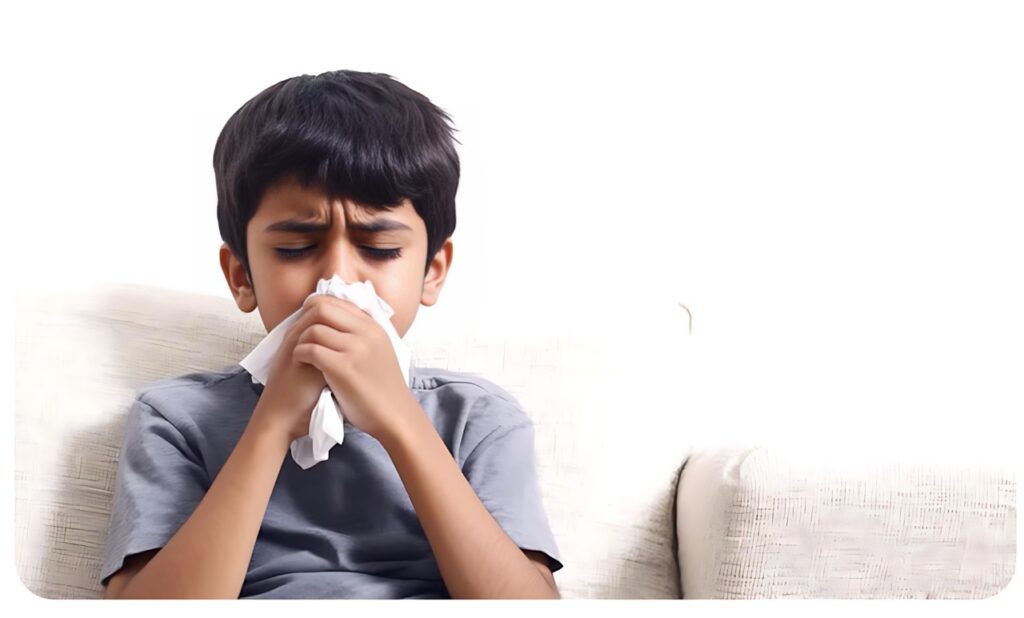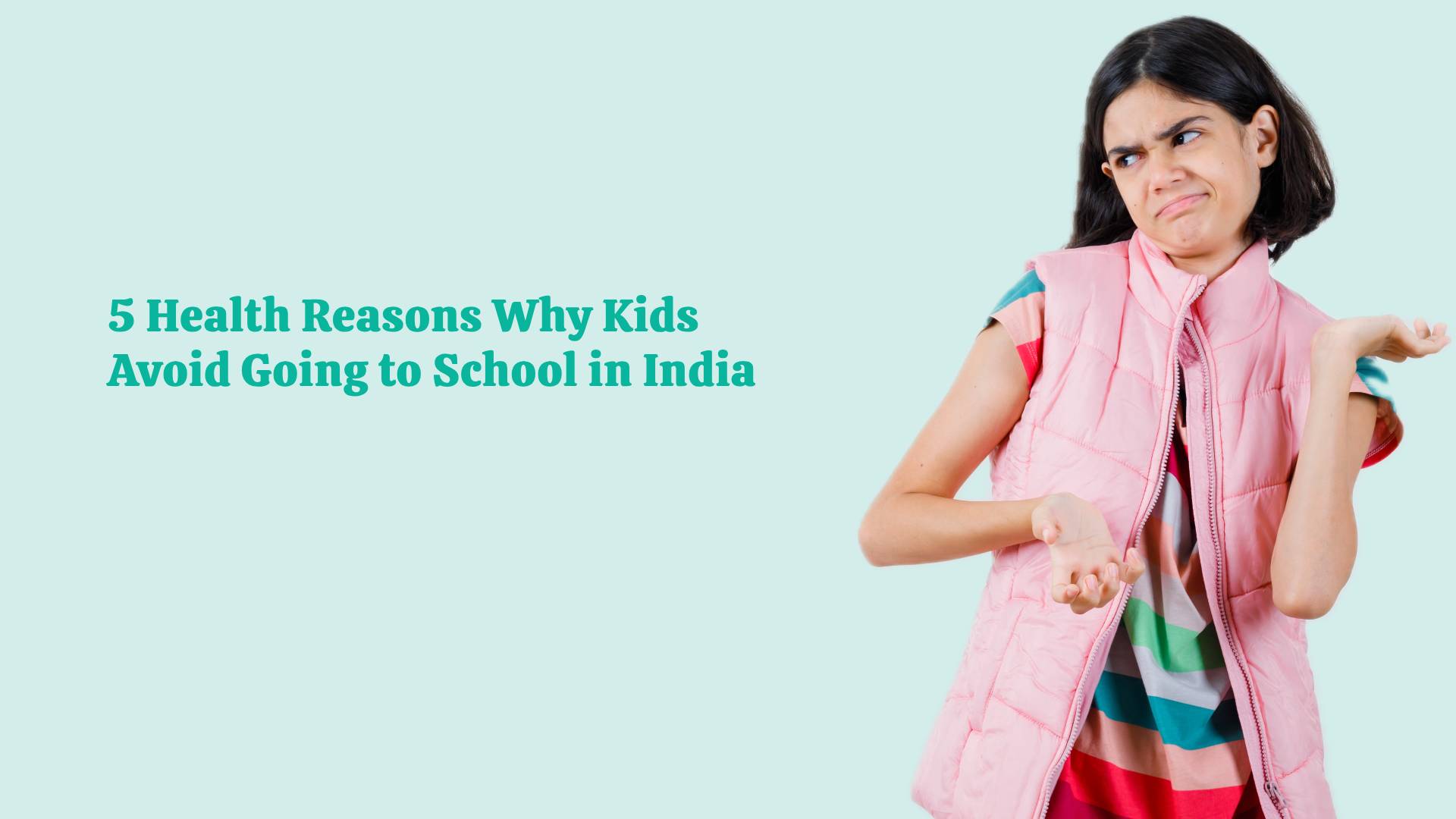On a bustling morning in Delhi, 10-year-old Aarav sat quietly at the breakfast table, his untouched plate of parathas pushed aside. His worried mother noticed his reluctance to get ready for school.
“I don’t feel like going,” Aarav mumbled, clutching his stomach.
This wasn’t the first time. Over the past month, Aarav had missed school several times, citing stomach aches, fatigue, or simply “not feeling well.” His parents initially dismissed it as laziness, but a visit to the doctor revealed a deeper issue: a combination of digestive problems and anxiety triggered by school stress.
Aarav’s story is not unique. Across India, millions of children miss school due to health challenges that go beyond the occasional cold. From asthma to mental health struggles, these issues silently chip away at their education and well-being.
In this blog, we explore five key health reasons why kids avoid going to school in India, diving into their causes, impacts, and actionable solutions.
The Hidden Health Barriers to Education
Education is the cornerstone of a child’s future, yet many Indian children face invisible barriers that keep them away from the classroom. According to the National Sample Survey (2017–18), nearly 10% of children aged 6–14 miss school regularly due to health-related issues. These aren’t just minor ailments; they range from chronic respiratory conditions to mental health challenges that demand urgent attention. The consequences are far-reaching – missed lessons, declining academic performance, and a weakened foundation for future success.
Understanding these health challenges is the first step toward ensuring every child can thrive in school. Let’s delve into the five major health reasons behind school absenteeism in India, drawing on data and practical insights to shed light on this critical issue.
Respiratory Issues: Breathing Barriers in the Classroom
India grapples with a significant burden of childhood asthma and allergies, affecting 6–10% of children, as reported by the Global Asthma Report (2018). In urban centres like Delhi, Mumbai, and Kolkata, the prevalence is even higher, with 10–15% of children battling asthma, (according to studies like ‘Indoor Air Pollution and Asthma in Children at Delhi, India’). Allergies, including chronic rhinitis, eczema, and food sensitivities, are equally common, making daily activities uncomfortable.
Poor air quality is a major culprit. Cities like Delhi often record Air Quality Index (AQI) levels in the “severe” category, exacerbating symptoms like coughing, wheezing, and breathlessness. For children with asthma, exposure to pollutants, pollen, or dust can trigger flare-ups, leaving them struggling to breathe. Morning congestion or breathing difficulties make getting ready for school a daunting task, leading to frequent absences.

Uncontrolled asthma and allergies disrupt more than just physical health. Children may feel embarrassed about wheezing in class or fear an asthma attack during physical education. These challenges reduce their willingness to attend school, resulting in missed lessons and social isolation. The cycle of absenteeism can also strain parents, who may need to take time off work for hospital visits.
Parents should watch for signs like frequent coughing or difficulty breathing and consult a paediatrician promptly. Allergy testing and asthma management plans, including inhalers, can help. Schools can contribute by improving indoor air quality with air purifiers and ensuring dust-free environments. Encouraging outdoor play in less polluted areas can also strengthen children’s respiratory health over time.
Digestive Problems: When the Gut Says No
Digestive issues are a leading cause of school absenteeism, particularly among young children. UNICEF India estimates that 1 in 10 children under five years of age experiences repeated episodes of diarrhoea – a problem that can persist into school years. Gastrointestinal infections – often caused by contaminated food or water – lead to stomach aches, indigestion, and diarrhoea, leaving children weak and reluctant to attend school.
Poor sanitation and hygiene are significant contributors. Inadequate access to safe drinking water and improper hand-washing practices increase the risk of infections. Additionally, the shift from fresh, home-cooked meals to ultra-processed foods like pizzas and burgers has disrupted children’s gut health. These foods, high in sugars and additives, harm the gut microbiome, which is critical for immunity and digestion.

Persistent digestive discomfort affects more than physical health – it impacts a child’s ability to focus in class. Imagine trying to concentrate on math while battling a stomach ache. For many children, the unease and embarrassment of frequent bathroom trips make school an unappealing prospect, leading to absenteeism and declining academic engagement.
It follows therefore, that hygiene education is paramount. Teaching children to wash hands thoroughly after using the toilet and before eating can reduce infections. Access to safe drinking water at home and school is non-negotiable. For chronic issues, parents should consult a doctor to identify food intolerances or underlying conditions. A diet rich in whole foods – fruits, vegetables, and fermented foods like curd – can restore gut health and reduce absenteeism.
Nutritional Deficiencies: The Energy Drain
Nutritional deficiencies are alarmingly common in India. The National Family Health Survey (NFHS-5, 2019–2021) reveals that 67% of children aged 6–59 months are anaemic, often due to iron deficiency. Deficiencies in vitamin D, vitamin B12, and other micronutrients like zinc and folate are also widespread, driven by diets heavy in polished rice and processed foods.
These deficiencies sap children’s energy and focus. Iron deficiency leads to fatigue and poor concentration, making it hard to stay alert during lessons. Vitamin D deficiency weakens immunity, increasing susceptibility to infections. For a child struggling to get out of bed or stay engaged in class, school becomes a low priority, resulting in frequent absences.
The decline in traditional foods like millets and leafy greens, coupled with overreliance on nutrient-poor processed foods, is a key driver. Maternal anaemia also plays a role, as it increases the likelihood of childhood anaemia. Poor nutrient absorption, often linked to gut issues, further compounds the problem.
Parents should prioritize nutrient-rich diets, incorporating organic fruits, vegetables, and protein sources. Consulting a nutritionist for tailored supplementation—such as methylated B vitamins for pregnant mothers or iron supplements for children—can address deficiencies. Schools can support this by offering balanced mid-day meals and educating families about healthy eating habits.
Mental Health Challenges: The Silent Struggle
Mental health issues are on the rise among Indian children. A NIMHANS survey estimates that 9.8 million teenagers need active mental health interventions. Anxiety – fuelled by academic pressure, bullying and peer stress – is particularly common, affecting 8% of children and teens. The COVID-19 pandemic has intensified these challenges, leaving many children grappling with persistent worry.
For children with anxiety or depression, school can feel like a battleground. Fear of failure, social judgment, or bullying can make attending classes overwhelming. Physical symptoms like headaches or stomach aches—often linked to anxiety—further discourage attendance. This reluctance to face school stressors leads to chronic absenteeism and academic setbacks.
What makes the problem worse is that mental health remains stigmatized in many Indian communities, making it harder for children to seek help. Parents may dismiss anxiety as “shyness” or “laziness,” delaying intervention. Open conversations about mental health are essential to normalize seeking support and addressing these challenges early.
Parents should validate their child’s emotions and foster open communication without judgment. Schools can play a pivotal role by implementing mental health awareness programs and providing access to counsellors. Gradual exposure to anxiety-inducing situations, coupled with positive reinforcement, can help children build resilience. For severe cases, consulting a psychologist is crucial to develop coping strategies.
Frequent Infections and Low Immunity: The Vicious Cycle
Acute respiratory infections (ARIs) are a leading cause of morbidity among Indian children, according to the Ministry of Health and Family Welfare. Frequent colds, fevers, and other infections, often viral, keep children out of school. Underlying malnutrition, including stunting and wasting, weakens immunity, perpetuating this cycle.
Malnutrition impairs the immune system, reducing the body’s ability to fight infections. A disrupted gut microbiome, caused by poor diet or antibiotic overuse, further compromises immunity. Children with frequent infections may also have undiagnosed immune deficiencies, requiring medical evaluation.
Recurrent illnesses disrupt learning continuity, making it hard for children to keep up with their peers. The physical toll of frequent sickness, combined with parental stress over medical costs, can erode a child’s enthusiasm for school, leading to long-term absenteeism.
Given the above circumstances, preventive care is key. Regular check-ups, timely vaccinations, and a balanced diet rich in zinc and vitamin A can bolster immunity. Hand-washing and mask-wearing during illness outbreaks can reduce infection spread. For children with persistent infections, parents should consult a doctor to rule out underlying conditions. Breastfeeding for the first two years is usually recommended as it helps strengthen early immunity.
A Call for Holistic Action
The health challenges keeping Indian children out of school such respiratory issues, digestive problems, nutritional deficiencies, mental health struggles, and frequent infections – are all interconnected. This demands a holistic approach for their treatment. Early identification of warning signs – from wheezing to anxiety – allows parents and educators to intervene promptly.
Schools must prioritize hygiene, mental health support, and nutritious meals, while parents should seek professional guidance for chronic issues. By addressing these barriers, we can ensure that children like Aarav not only attend school but thrive in it.
Let’s work together to create a healthier, more inclusive educational environment for every child in India. If your child is struggling, book an appointment with a healthcare professional at Wellfinity, for tailored solutions that pave the way for a brighter future.



